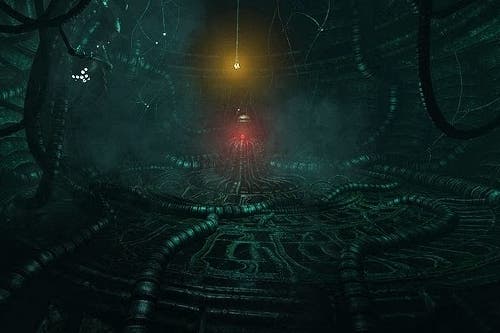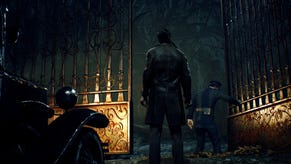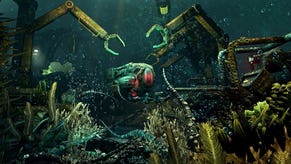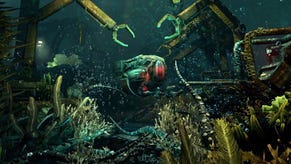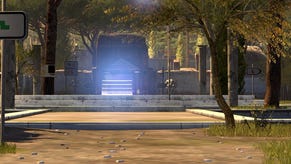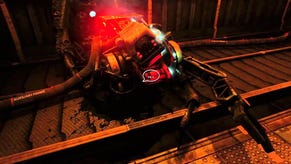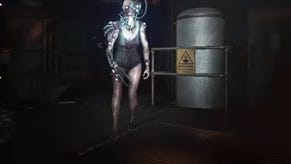Simon says don't panic: We examine Frictional's upcoming horror game Soma
Darling it's better down where it's wetter.
The voice in my head is not the voice in my game. That's what I keep thinking as I play the early stages of Soma, Frictional's upcoming spiritual successor to Amnesia: The Dark Descent. Like Amnesia, Soma is a first-person horror game. Unlike Amnesia, your character talks this time around. Unfortunately, he displays fraught peril of a man running late for a date.
The demo - played in a dimly lit hotel room in San Francisco - begins with your character walking through a peculiar tunnel comprised of what appears to be metallic scales. At once industrial and alien, it eventually opens up into a derelict research facility that years of sci-fi cliches have led me to believe is in space - which we soon find out it isn't. The dimly lit corridors are littered with more scaly metal architecture haphazardly jutting into the geometry and upon closer inspection these formations are subtly moving, as if they're breathing. I don't know what's going on, but I don't like it.
My character, however, is only moderately bothered by this eerie ordeal. Upon finding a comm station and explaining he's been kidnapped, he exhibits the casual nonchalance of Assassin's Creed's Desmond. As I understand it, being spirited away to a haunted subterranean research vessel is kind of a bummer.
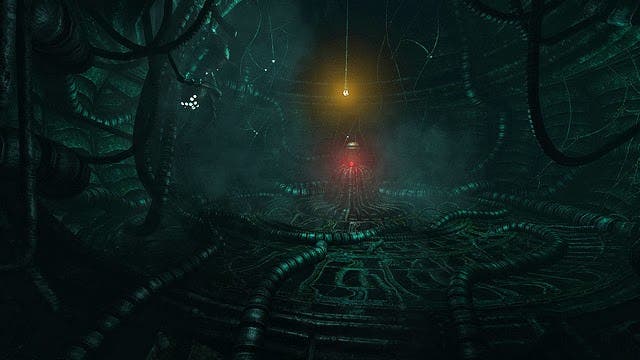
Frictional co-founder Thomas Grip explains the logic behind giving the player character, Simon, a voice. "The main reason was because they had to talk with other characters," he says. "It just came from that. Otherwise the character would be so dull. They would just be pushing him around like a dog or something."
On this note, I agree with Grip. I'm in the camp that didn't mind Gordon Freeman not talking in the first Half-Life where he spent most of his days wondering an abandoned research facility doing battle with aliens, but found his silence distracting in the sequel where he has a pseudo-romantic interest. I found myself similarly puzzled by Metro 2033's lead only narrating the load screens, then staying mum on the adventure. As Bioshock Infinite proved, a speaking first-person character can add a lot to the experience. As Bioshock Infinite also proved, it helps to have Troy Baker. Soma doesn't have Troy Baker.
"We had this idea that there'd be lots of talking. You'd constantly be commenting on things," Grip continues. "But it just didn't work so now it's almost only in dialogue. We're we're still sort of tinkering to figure out what stuff works best."
Experiential narrative-based games are a hard thing to test, it would seem. If you know where the scares are, they stop being scary. Design a puzzle and you have no concept of how intuitive it will be for anyone else. As such, much of Soma's details are up in the air, but Grip notes that he wants the game to be less puzzle-focused than The Dark Descent.
"Pure puzzle-wise, it's a bit in-between [both Amnesia games]," Grip says, noting that Amnesia: A Machine for Pigs was pretty straightforward while The Dark Descent was built around puzzle hubs. "We want to keep it very streamlined, so the player doesn't have their mind on solving puzzles."
"In Soma, our main goal is to keep the focus on narrative," he explains, which reminds me of what Dan Pinchbeck said when I interviewed him for Eurogamer's A Machine for Pigs post-mortem. This makes a lot of sense to me, but what I'm less clear on is why add them back?
"There should be something interesting for the player to do, so it fills them with a sense of accomplishment," Grip explains. "We want you to feel like you are a source of progression in the game. That you're constantly doing stuff that's allowing the story to progress."
"We actually started the game without any puzzles at all," he continues. "We had open areas, and we had a very, very clear exit. Then our thinking was that the player could just roam around and do whatever they like, and there would be puzzle-like elements, then whenever they felt like they'd had enough, they could exit into the next scene... But we found that people were like 'What are we supposed to be doing?' It was very hard to motivate them."
Another reason for Simon's voice and puzzle-solving prowess is that Soma tells a more immediate story than Frictional's predecessors. "In Pigs and The Dark Descent, it was mostly about 'this has happened.' You're reading notes about stuff that's happened, but in Soma the player is the driving force," Grip says. "There is a lot of back-story, but we're not focusing on that. Someone should be able to play the game from start to finish and be able to just skip pretty much all back-story and you're still getting the story."
This isn't to suggest that there won't also be a rich back-story - it will just be buried a little deeper. It will still be there for lore-focused sleuths, but it will really take some digging to uncover. "Everything's there for a reason," Grip boasts. "You can look at one of the transcripts on the terminal and you can think about why they're there. There's a story reason for every single one of those, so it all connects to what has happened and we've put up other clues for that sort of thing... You get almost as much story content thinking about the placement of an audio log than you do listening to the audio log."
One subtle detail I notice is in the demo's second half focusing on an underwater section midway through the game. The player has no HUD and runs out of breath when running, which makes little to no sense as he shouldn't be able to breath anyway. Is the lack of HUD a deliberate choice to minimise screen clutter? Are we supposed to imagine Simon is in a suit the same way we imagine Gordon Freeman's invisible hands turning a steering wheel? Or is this something else? Is Simon even literally underwater?
"It's not going to be that confusing when you play the real thing," Grip teases. "I'm glad you picked that up." How mysterious!
This question of what's real seems like it's going to come up a lot in Soma's enigmatic narrative. My grasp of the story was tenuous at best based on the demo, but my interest is piqued when a dying robot says he's happy to see me before he realises that I'm not someone called Amy. Sorry pal! I'm even more intrigued by Soma's monsters: a ghostly scuba gear-wearing faction called the Jiangshi (a Chinese word for zombie). When their glowing blue light-emitting helmets catch my gaze the screen tends to go all staticy. So there's no scuba HUD, but there is a static effect? I'm not sure what's real anymore and that seems to be the point.
"I'm really, really interested in the idea of subjective experience," Grip tells me when cryptically discussing Soma's overarching themes. "Why is it that I can have feelings and sensory input and no one can say what they really are? Like I can assume that you have some conscious experience, but I can do no tests, even in theory, that confirms that. I just have to assume that because I have it. It's just interesting. Where does that come from? This has been a hobby of mine for half my life and it just came to me that this works perfectly in a first-person game because it's like you're the disembodied spirit that give orders to this person inside the game. It feels like you should be able to explore these themes through playing in first-person."
While Soma is certainly a supernatural experience, it's much more grounded in the real world with its hard sci-fi angle. "For what we wanted to do with the story it had to be either futuristic or in a fantastical realm," Grip explains. "And if you go with a fantastical realm, you lose a bit of your connection to the real world. You don't think of it as something that could happen from where we are now. You can kind of push it aside."
"There are important plot developments that have to do with why Simon ends up where he ends up that are very much related to technology today, but just extrapolated," he adds. "This makes it sort of fantastical, but it still has roots in to what exists today. I feel like that's an important ingredient in getting the player to feel what we're trying to achieve." Oh s***! Could Soma be the prophetic result of Facebook buying Oculus?
It's hard to get a feel for what Frictional is up to with Soma, but Grip tells me this demo is mostly set up to showcase the game's atmosphere, which is perhaps the most important aspect in any Frictional game. Aside from the occasional utterance from its lead character, Soma remains every bit as unsettling and mysterious as Frictional's previous efforts. And with the Bioshock series wrapping up last week, we'll be craving another undersea adventure by the time Soma launches next year on PC and PS4. Now Simon, would you kindly pretend to give a f***?
